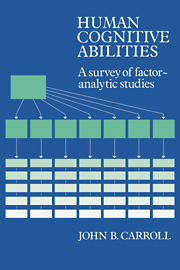Book contents
- Frontmatter
- Contents
- Preface
- PART I INTRODUCTION TO THE SURVEY
- Chapter 1 The Study of Cognitive Abilities
- Chapter 2 Historical Foundations of the Study of Cognitive Abilities
- Chapter 3 Survey and Analysis of Correlational and Factor-Analytic Research on Cognitive Abilities: Methodology
- Chapter 4 Survey and Analysis of Correlational and Factor-Analytic Research on Cognitive Abilities: Overview of Outcomes
- PART II THE IDENTIFICATION AND DESCRIPTION OF COGNITIVE ABILITIES
- PART III ISSUES
- References and List of Datasets
- Appendix A Codes for Countries, Samples, and Factors
- Appendix B Hierarchical Factor Matrix Files
- Name Index
- Subject Index
Chapter 1 - The Study of Cognitive Abilities
Published online by Cambridge University Press: 29 September 2009
- Frontmatter
- Contents
- Preface
- PART I INTRODUCTION TO THE SURVEY
- Chapter 1 The Study of Cognitive Abilities
- Chapter 2 Historical Foundations of the Study of Cognitive Abilities
- Chapter 3 Survey and Analysis of Correlational and Factor-Analytic Research on Cognitive Abilities: Methodology
- Chapter 4 Survey and Analysis of Correlational and Factor-Analytic Research on Cognitive Abilities: Overview of Outcomes
- PART II THE IDENTIFICATION AND DESCRIPTION OF COGNITIVE ABILITIES
- PART III ISSUES
- References and List of Datasets
- Appendix A Codes for Countries, Samples, and Factors
- Appendix B Hierarchical Factor Matrix Files
- Name Index
- Subject Index
Summary
Our work is primarily with the grade book of the psychologist.
Clark Wissler (1901)SOME PROBLEMS OF DEFINITION
A predominant and recurring concern throughout this book is the identification and description of cognitive abilities. I had better be clear, at the outset, on what I mean by ability, cognitive ability, and related terms.
Ability
Although the term ability is in common usage both in everyday talk and in scientific discussions among psychologists, educators, and other specialists, its precise definition is seldom explicated or even considered. It is a word that seems to be accepted as a sort of conceptual primitive, and in fact it is intimately related to such commonly used words as able and the simple modal auxiliary can. It is sometimes used to characterize material objects, as in the sentence “This bullet has the ability to penetrate a wooden board three inches thick.” More frequently, however, it is used to characterize attributes of human individuals, as in expressions like athletic ability, musical ability, and (in the context of this book) cognitive ability. It expresses a kind of potential, a term which has merited the attention of philosophers of education (Scheffler, 1985).
Oddly enough, dictionaries are of little help in developing an exact, analyzed meaning of the term. The American Heritage Dictionary, for example, defines ability as “the quality of being able to do something; physical, mental, financial, or legal power to perform.”
- Type
- Chapter
- Information
- Human Cognitive AbilitiesA Survey of Factor-Analytic Studies, pp. 3 - 29Publisher: Cambridge University PressPrint publication year: 1993
- 1
- Cited by



